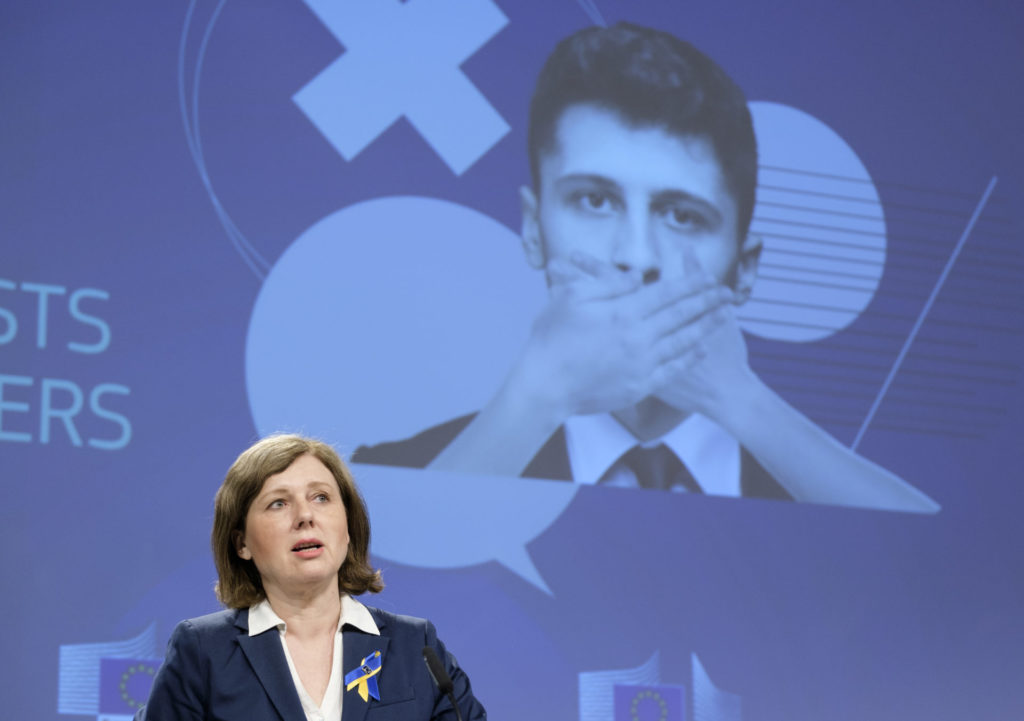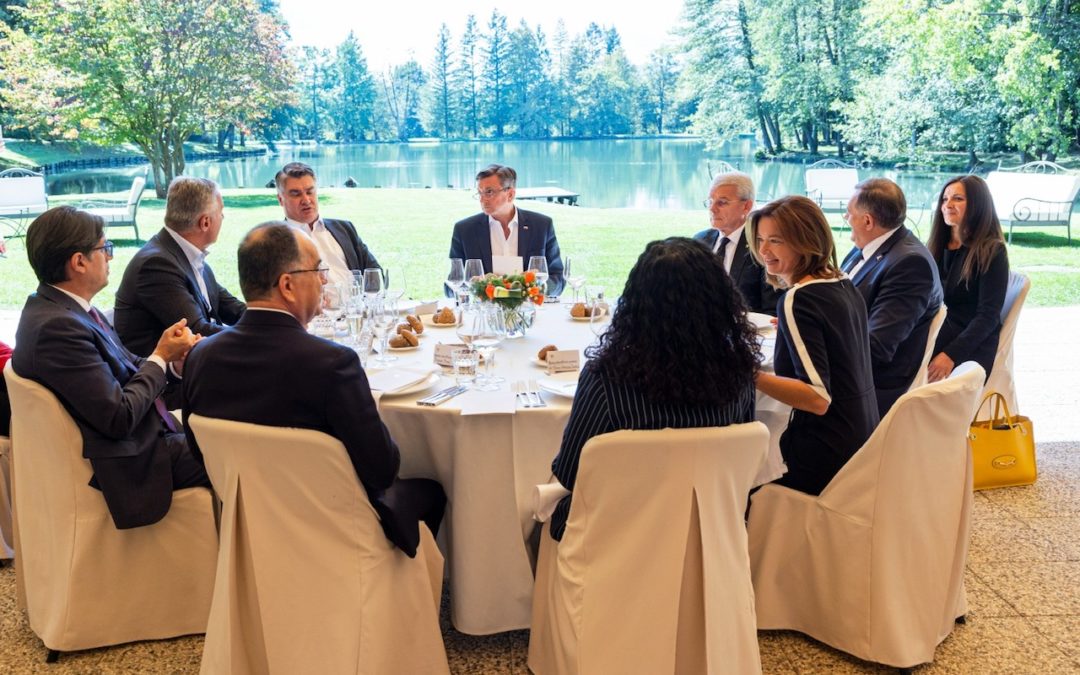 Have the article read by OpenAI (Beta). Please note that AI translations may take some time to process.
Have the article read by OpenAI (Beta). Please note that AI translations may take some time to process.Slovenia: Western Balkans leaders met for the Brdo-Brijuni summit
Brdo pri Kranju (STA) – Western Balkan leaders met for the Brdo-Brijuni summit in Slovenia on Monday. They once again underlined the importance of EU enlargement for the stability of their region. Now more than ever, this has become a geopolitical issue, they believe. The leaders did not produce a final declaration at the summit. Slovenian President Borut Pahor told the press he was happy that the summit even took place given the challenging circumstances, and that they were able to agree on six resolutions. In the six resolutions the leaders managed to agree on, they called on the EU to grant Bosnia-Herzegovina EU candidate status by the end of the year, introduce a visa-free travel regime for the entire Balkans, and help the region in mitigating the effects of the economic and energy crises.
Pahor said that the idea of a final declaration had been given up already during preparations for the summit when it became clear consensus could not be reached. Allegedly, the reason for this was disagreement over Croatia’s wish that the declaration mentions the constitutionality of all three nations of Bosnia-Herzegovina. Croatians in Bosnia-Herzegovina are pushing for an election reform, which is not supported by the Bosniaks. In a separate statement after the meeting, Šefik Džaferović, a member of the Bosnia-Herzegovina’s presiding trio, said that electoral legislation was an internal matter of his country and that the Brdo-Brijuni Process initiative was not a forum dedicated to Bosnia’s internal affairs. Croatian President Zoran Milanović criticized the EU for granting candidate status to Ukraine in June but not to Bosnia. He believes that an organization conducting its foreign policy in such a way was not on the right path. Meanwhile, Pahor said that granting candidate status to Bosnia-Herzegovina, even if only a symbolic move, was a geopolitical issue par excellence.
Kosovo President Vjosa Osmani commented on the visa-free travel regime, expressing the expectation that it would indeed be introduced. Kosovo remains the only Western Balkan country whose nationals require a visa to enter the EU. Osmani also said that Kosovo would lodge a candidate status request with the EU. The leaders also affirmed their dedication to dialogue as the only path to overcoming differences. Hosted by Pahor and Milanović, the summit featured their counterparts from the region. The summit was attended by Albanian President Bajram Begaj, Bosnia and Herzegovina’s presiding trio Željko Komšić, Milorad Dodik and Džaferović, Montenegro’s President Milo Đukanović, Kosovo’s Osmani, North Macedonia’s Stevo Pendarovski and Serbia’s Aleksandar Vučić. (September 12)
Eurozone acknowledges risk of recession and promises anti-inflation measures
Prague (EFE) – Eurozone governments are aware that the war in Ukraine has increased the risk of a recession. However, they have ruled out that the economy is inevitably doomed to slump and have promised to take measures to contain inflation and mitigate its effects on households and businesses.
“The risk has increased, but the recession is not inevitable,” Eurogroup President Paschal Donohoe and European Commissioner for Economy Paolo Gentiloni told a press conference last Friday after a meeting of Eurozone finance and economy ministers in Prague. The ministers discussed how to respond to the crisis stemming from the Russian aggression, which has increased energy prices, pushed inflation in the Eurozone to a record 9.1 percent in August and forced it to lower growth forecasts of the Nineteen to the point that the European Central Bank (ECB) anticipates a recession in the event of a total cut-off of Russian gas.
So we need to find a delicate balance between promoting growth, controlling inflation and protecting the most vulnerable.
EU Executive Vice President Valdis Dombrovskis
In this scenario, the ministers agreed that they will continue to “intervene to support the most vulnerable households and businesses” in the face of an “unprecedented challenge”: Donohoe said: “We need to bring inflation down. If we don’t, our citizens will be poorer in the long-term.” The measures should be temporary and selective and preferably based on income rather than on intervention in market prices, participants agreed. Such a combination will be difficult to achieve at a time of growing social pressure to curb a price escalation that has reached the entire shopping basket. (September 9)
Media monopoly and pressure on journalists: Brussels arms itself against abuses

Brussels (AFP) – Wary of the deterioration of press independence in Hungary and Poland, the European Commission has decided to adopt a law to regulate media mergers and protect journalists from pressure. Newsrooms should be independent of political or industrial power and media ownership should be transparent, according to a draft regulation of which AFP has obtained a provisional version. In case of non-compliance, the “Media Freedom Law” will allow the Commission to initiate proceedings in the European courts. It will be officially presented by the Commission at the end of next week.
Commission Vice-President Věra Jourová has repeatedly expressed a feeling of powerlessness, pointing to Brussels’ “limited” room for maneuver in the media sector. This was particularly evident in the creation of the pro-Viktor Orban media conglomerate in Hungary in 2018, where European competition rules could not be applied. (September 10)
Stability and Growth Pact (SGP) reform gets into full swing, European Commission proposals in October
Prague (ANSA) – The era of post-Covid expansionary policies is set to end. 2023 will have to be the year of “prudence” and a return to debt sustainability. The message coming from the informal meeting of finance ministers in Prague leaves no room for ambiguity: the 27 must gear up for targeted and temporary investments without losing sight of their budgets in a policy shift imposed on them by the impact of inflation. That approach will also guide the revision of the Stability Pact that the Commission will launch at the end of October.
EU Executive Vice President Valdis Dombrovskis said “the key to the revision is broad convergence” but added that the devil lay in the details. Those details are likely to rekindle the debate between hawks and doves. According to one European source, an overall agreement is far from being reached and even France and Germany don’t appear to be on the same page, with the latter appearing to be playing the hawk role again.
By contrast the Netherlands, with a joint document signed with Spain last April, has taken a more open-minded stance by saying yes to fiscal consolidation tailored to the specific realities of the countries. By providing a one-twentieth cut in the share of debt that exceeds 60 percent of GDP each year, debt reduction could be paced “more realistically.”
“We need to ensure that debt is actually reduced, reduce complexity and improve compliance,”
EU Executive Vice President Valdis Dombrovskis explained.
The other hot topic is investments. The idea of unbundling those related to green and defense has been rejected by Germany but continues to have several supporters among European governments. Dombrovskis called green, digital, and European security investments “necessary,” without going into further details. At the same time, it will be necessary for the EU Commission to simplify the parameters of EU surveillance, basing them on a single indicator such as a benchmark of public spending. (September 10).
German Chancellor Olaf Scholz and EU Council President Charles Michel emphasize European cohesion in the energy crisis
Berlin (dpa) – German Chancellor Olaf Scholz (SPD) and EU Council President Charles Michel have stressed European solidarity in the energy crisis. Scholz said during a meeting with Michel in Berlin on Friday that the Russian president had all but halted gas supplies to the West. “By stopping gas deliveries, President Putin aims to weaken and destabilize the European democracies. He will not succeed. He has made a misjudgment, as we Europeans are standing side by side in solidarity,” Scholz said,
More than ever, Michel added, Europe saw that it needed unity. Ukraine would continue to receive support in all areas. The sanctions, he said, were aimed at making clear that the EU was united against the unjustified attack against Ukraine. (September 9)
This is a compilation of the European coverage of enr news agencies. It is published Wednesdays and Fridays. The content is an editorial selection based on news by the respective agency.
